The End of Neoliberalism and the Rise of the Solidarity Economy: A Report
Summarised by Yoshihiro Nakano
(15/06/2009)
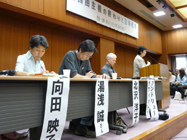
|
It was a hot Sunday afternoon on June 7th, when we held a one-day symposium entitled “The End of Neoliberalism and Solidarity Economy” at Sohyou Kaikan in the heart of Tokyo. This was a meeting to share perspectives on the current global economic crisis and to discuss the solidarity economy worldwide as a possible counter movement with its Japanese protagonists and practitioners. We had four renowned speakers on this subjects: Andrew DeWit, Yoko Kitazawa, Makoto Yuasa, and Eiko Mukouda. More than 170 people crowded into a venue that has the capacity for 100 people. The following is a summary of the presentations given by the four guest speakers.
|
1.Andrew DeWit (The Department of Economics, Rikkyo University)
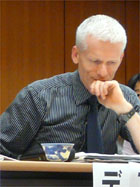
|
Andrew DeWit is a political economist who has written a number of articles and books critical of neoliberal economic policies. In his presentation, he summarised the neoliberal approach and the global economic crisis it has spawned. He also discussed the prospects for an alternative, green model. One novelty of the current economic crisis, he argues, is evident in its scale and speed. In terms of speed, the impact of the recession has globalized far more rapidly than during the Great Depression. In terms of scale, the financial and real economies are both profoundly affected. The effect of the crisis is particularly serious in Japan which has suffered the steepest decline in growth of any major economy since the US experience during the Great Depression. As for the US, a country which proclaims the idea of economic liberalism and has played a leading role in promoting neoliberal economic globalisation for decades, President Barack Obama is taking measures to nationalise several major corporations after the bankruptcy of Lehman Brothers Holding Inc. Many of these actions are largely without precedent in the history of America.
DeWit argues that to resolve the crisis, Japan, the US and other economies need to shift their policy orientations from neoliberal marketisation to an environment-centred economic policy. He notes that the Green new deal proposed by Obama is essential. He suggests that it may be possible to foster the solidarity economy within this macro environmental project, by using such opportunities as the “smart grid” to bolster local production and exchange in that most critical of all items: energy.
|
2.Yoko Kitazawa (Columnist on International Affairs)
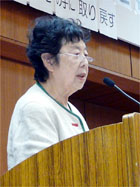
|
Yoko Kitazawa explained the significance of solidarity economy in a history international political economy. First of all she states that today’s economic crisis is not merely the end of neoliberalism and but also the crisis of capitalism in general. Therefore we need another economy and another society. The roots of solidarity of economy can be dated back to the 19th century French social economy and to a number of experiments of cooperatives and associations. However, the most vivid and direct example of solidarity economy can be found in the Latin American social movements since the 1990s.
Kitazawa told her initial encounter with the word ‘solidarity economy’ when she visited Proto Algere. This southern city of Brazil experimented a fiscal policy called the ‘participatory budgeting programme’ under the Communist local government since the 1990s, which permitted the delegates from residents to join the process of decision-making. Through this policy method, the budget is effectively allocated to the most needed issues such as the management of slum communities and the improvement of public transformation, and as a result, the well-beings of the residents have been significantly improved in comparison with other Brazilian cities such as Sao Paolo and Rio de Janeiro. One of the central characteristics of participatory budgeting is that, in Porto Alegre, the budgets are allocated to the network of cooperatives and associations and the aforementioned social issues are managed collectively through them. In other words, the city is reconstructed through the initiative of civil society, which is neither the state nor the market.
Kitazawa recalls that ‘solidarity economy’ is a word that people in Porto Alegre used for designating all these social activities; the word subsequently became a currency in the first World Social Forum in 2001 and promoted the international network of solidarity economy. She argues that, in the current situation where the capitalist economy is systematically breaking down, alternative methods of managing our everyday lives are necessary and that it is a time to construct the movement in the Asian region to hold the Asian Forum for Solidarity Network.
|
3.Makoto Yuasa (Director of Homeless Support Center ‘Moyai’)
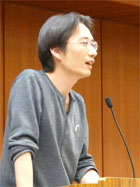
|
Yuasa Makoto founded the NPO ‘Moyai’(http://www.moyai.net/) in the mid-1990s. This organisation aims to help the social insertion of homeless people chiefly by taking a position of guarantor, so that the homeless find accommodation. It also offers consultancy to support homeless people on the daily base and provides a communication space called ‘salon’. Yuasa acknowledges the fact that the activities of Moyai are now recognised by some people as a variation of solidarity economies. He wonders, however, to what extent his NPO is part of t
he current of solidarity economy movements and tethered to the ideal of solidarity economy in general. Therefore he raised several questions based on his activities.
●If the NPO helps a homeless to find an accommodation but if that person leaves his/ her place in a few weeks, then is that activity successfully called ‘solidarity economy’?
●Similarly, if the homeless finds an accommodation but if that person returns to the street due to the missing of human relationships established during the homeless period, then is that activity successfully called solidarity economy?
Likewise, Yuasa brings to light the question of sustainability. In facing these problems, he also introduced several achievements from his NPO activities. When he began to support the homeless’ social insertion, he faced a problem with how to clean up the room which the tenant (ex-homeless) left. There are a lot of rubbishes that cannot be disposed by one person. Then, Yuasa offered a cleaning job to a group of homeless people who were registered to the Moyai, in coordination with other recycling NPOs. This permitted the homeless people to earn small amount of money and to get the means to survive. Today, some of them can earn their living through the cleaning job. In reflecting this fact, Yuasa remarked that this kind of sustainable activity could sufficiently be called a name of solidarity economy.
|
4. Eiko Mukouda (Women’s and Citizens’ Community Bank)
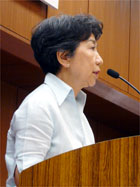
|
Eiko Mukouda is a president of Women’s and Citizens’ Community Bank (WCB), a Kanagawa-based civic finance. This community bank aims to finance civic activities organised by women with full transparency and lower interest rate. The WCB is financing those civic enterprises coordinated by the workers’ collectives and NPOs, including the support of homeless people, the building of environmentally friendly housing, collective kitchens, and daily care of elderly people.
The bank was initially founded as an alternative to commercial banks which discriminate women in financing and whose use of deposits was unclear. The philosophy of WCB is that the money should be used for social responsible activities. Given that the money is the ‘nerve’ of local economy, it is pivotal to invent a new method of financing that support uneconomic civic activities which are otherwise marginalised in the mainstream market economy. In this respect the WCB can be said to contribute to consolidating the autonomy of local societies.
However, the problems still remain. One of the major problems is the institutional constraint. Under the current law, the NPO banks are put into the same business category as moneylender, or loan shark, and the Japanese government recently strengthened the minimum registration cost to approve the business. Mukouda argues that the management of NPO banks will become difficult unless they are treated independently and the specificity and importance of their activities are recognised legally. Currently, a network of NPO banks are sending a petition to Financial Services Agency, to ask to exempt them from the new law.
|
|




